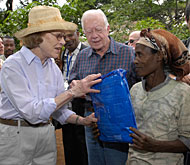The Carter Center Malaria Control Program
Each year, malaria kills more than 1 million people, mostly children, with 350-500 million cases reported worldwide. Approximately 90 percent of all cases of malaria – a preventable disease – are in Africa, where one child in 10 dies before the age of five. The Carter Center, in partnership with the ministry of health in Ethiopia, is committed to rapidly increasing the numbers of persons who live in malarious areas of those countries who benefit from protection from sleeping under long-lasting insecticidal bed nets. Millions of nets have been distributed. The Center's expert staff will also closely monitor the impact of the long-lasting insecticidal bed net intervention on malaria incidence, fever and associated anemia.
Read about the Malaria Control Program's success in Ethiopia
Community-Based Effort
The Carter Center's strength has long been to work at grassroots levels to help make things happen. The Carter Center's Malaria Control Program is using a village-based health care delivery infrastructure to help the free distribution of long-lasting insecticidal bed nets to all members of at-risk communities. By filling the gaps and helping to provide LLINs with face to face health education on how to use them, the Center's focus is an example of what can be achieved through community-based, collaborative efforts.
The 'Integrated Approach'

Long-lasting impregnated bed nets, like the one presented to Mrs. Hlmenlike by former First Lady Rosalynn Carter in January 2007, were distributed throughout Ethiopia. The Carter Center/L. Gubb
The Carter Center's Malaria Control Program not only works in coordination with existing national malaria control program in Ethiopia, but also within the Center's other existing programs such as trachoma control, river blindness, lymphatic filariasis programs, and in Ethiopia, with the Ethiopia Public Health Training Initiative. By utilizing a village-based health care delivery infrastructure – merging resources, personnel, health education, and treatment for several diseases into one delivery system – isolated communities become healthier. Thanks to these village-based interventions, in place for more than 15 years in some locations, children have the opportunity to grow up no longer fearing the blindness, disfigurement, and life-sapping fevers that their parents suffered.
Ethiopia
The initial focus of the Malaria Control Program has been to assist Ethiopia's Ministry of Health in its goal to protect all 50 million Ethiopians at-risk for malaria through free distribution of long-lasting insecticidal bed nets to cover the entire malaria at risk population by July 2007. By purchasing the balance of nets needed by the national program – 3 million of Ethiopia's estimated total 20 million nets – and by coordinating net distribution and health education on malaria in the Amhara, Southern Nations, Nationalities, and People's Region (SNNPR), and Oromiya regions, the Center will help protect 18 million people at-risk: 36 percent of the total population at-risk in Ethiopia. In addition to long-lasting insecticidal bed net distribution, the Center will work with other partners to assist with health education and evaluation of the national program.
Read about the Malaria Control Program's success in Ethiopia
Back to Carter Center main page
Adapted with permission from the Carter Center website,www.cartercenter.org, February 2009.

- Emily Staub
- Associate Director, Public Information
- Press Liason to the Health Programs
- Phone: 404-420-5100
- Email: carterweb@emory.edu
- www.cartercenter.org/health/index.html